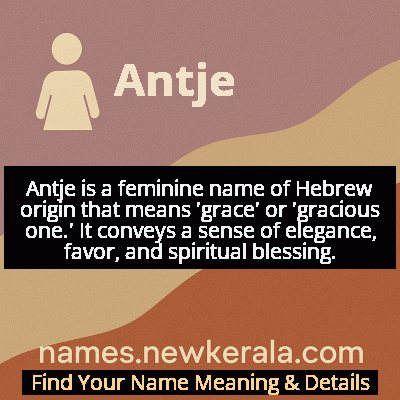Antje Name Meaning & Details
Origin, Popularity, Numerology Analysis & Name Meaning of Antje
Discover the origin, meaning, and cultural significance of the name ANTJE. Delve into its historical roots and explore the lasting impact it has had on communities and traditions.
Name
Antje
Gender
Female
Origin
Hebrew
Lucky Number
5
Meaning of the Name - Antje
Antje is a feminine name of Hebrew origin that means 'grace' or 'gracious one.' It conveys a sense of elegance, favor, and spiritual blessing.
Antje - Complete Numerology Analysis
Your Numerology Number
Based on Pythagorean Numerology System
Ruling Planet
Mercury
Positive Nature
Adventurous, dynamic, curious, and social.
Negative Traits
Restless, impatient, inconsistent, prone to indulgence.
Lucky Colours
Green, white.
Lucky Days
Wednesday.
Lucky Stones
Emerald.
Harmony Numbers
1, 3, 9.
Best Suited Professions
Sales, marketing, travel, entertainment.
What People Like About You
Versatility, charisma, adventurous spirit.
Famous People Named Antje
Antje Traue
Actress
German actress known for roles in 'Pandorum' and 'Man of Steel'
Antje Duvekot
Singer-songwriter
German-American folk singer acclaimed for her poetic lyrics and multiple Boston Music Awards
Antje Jackelén
Religious Leader
First female Archbishop of the Church of Sweden, serving from 2014-2022
Antje Weisheimer
Scientist
German climate scientist and professor at University of Oxford, contributing to seasonal forecasting research
Name Variations & International Equivalents
Click on blue names to explore their detailed meanings. Gray names with will be available soon.
Cultural & Historical Significance
The name embodies a blend of biblical heritage and regional identity, representing both religious devotion and cultural pride in Northern European communities. In the 19th and early 20th centuries, Antje became particularly associated with the emerging middle class in German-speaking areas, symbolizing respectability and traditional values while maintaining a distinctive regional character. The name's persistence through various historical periods demonstrates its enduring appeal and the importance of cultural continuity in naming practices.
Extended Personality Analysis
Individuals named Antje are often perceived as graceful, resilient, and practical. They typically exhibit a balanced combination of traditional values and modern independence, reflecting the name's roots in both biblical heritage and Northern European practicality. Antjes are frequently described as dependable and hardworking, with a quiet strength that enables them to overcome challenges without drawing excessive attention to themselves. Their grace extends beyond mere elegance to include a genuine kindness and consideration for others, making them excellent friends and community members.
Many Antjes demonstrate strong organizational skills and attention to detail, coupled with an artistic sensibility that allows them to appreciate beauty in everyday life. They tend to be loyal and family-oriented while maintaining their own identity and pursuing personal goals with determination. The combination of their practical nature and emotional intelligence often makes them effective problem-solvers who can navigate complex situations with both logic and empathy. While they may appear reserved initially, Antjes typically form deep, meaningful relationships and are valued for their consistency and integrity.
Modern Usage & Popularity
In contemporary times, Antje remains most popular in Germany, particularly in the northern regions and among Frisian communities. While its usage has declined somewhat from its peak in the mid-20th century, it maintains a steady presence as a traditional choice that feels both classic and distinctive. The name has seen some revival among parents seeking Germanic names with historical roots but less common than more popular choices like Anna or Emma. Outside German-speaking countries, Antje is rare but occasionally used by families with German heritage seeking to maintain cultural connections. Modern naming trends show that Antje appeals to parents who value authenticity and cultural specificity over international popularity, making it a choice that signals both individuality and respect for tradition.
Symbolic & Spiritual Meanings
Symbolically, Antje represents grace under pressure, resilience, and cultural continuity. The name embodies the concept of enduring beauty and strength that persists through challenges, much like the coastal communities where it originated. It symbolizes the balance between tradition and individuality, reflecting how personal identity can honor heritage while forging new paths. The grace associated with Antje extends beyond physical elegance to include moral and emotional grace—the ability to handle difficulties with dignity and compassion. In metaphorical terms, Antje represents the quiet strength found in everyday perseverance and the beauty that emerges from practical wisdom and genuine kindness, serving as a reminder that true grace involves both inner character and outward bearing.

